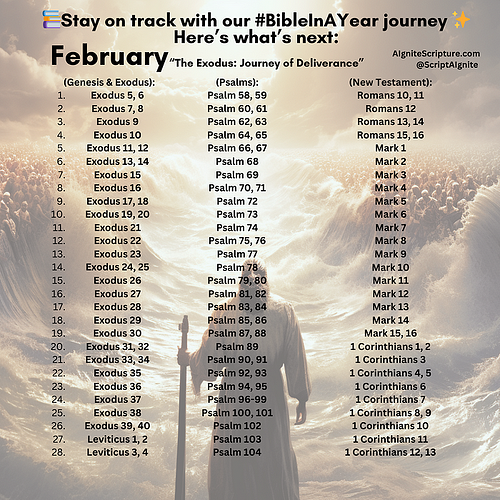 February 3: Psalm 62, 63 - Trust in God, The Thirst for God
February 3: Psalm 62, 63 - Trust in God, The Thirst for God
 Introduction
Introduction
Dive into the heart of King David today, magnifying God’s love, his trust and dependence on God alone, and his longing for Him in ‘Psalm 62 and 63’.
 Psalm 62: Unshakeable Trust
Psalm 62: Unshakeable Trust
In the midst of adversity, David embraced God as his rock and fortress. His dependency on God was total.
![]() Key Verse:
Key Verse:
“Truly he is my rock and my salvation; he is my fortress, I will never be shaken.” - Psalm 62:2
David’s firm trust displays a model for us to follow, demonstrating how faith in God provides unwavering stability regardless of life’s storms.
 Psalm 63: Deep Thirst for God
Psalm 63: Deep Thirst for God
David’s longing for God is beautifully portrayed in Psalm 63. Even in the wilderness, David’s soul clung to God as his only source of relief and satisfaction.
![]() Key Verse:
Key Verse:
“O God, you are my God, I seek you, my soul thirsts for you.” - Psalm 63:1
His yearning echoes our own spiritual hunger, emphasizing the critical need to actively seek God’s presence in our lives.
 Key Themes and Reflections
Key Themes and Reflections
- Genuine Dependence on God: In both psalms, David’s total reliance on God is made clear. His trust and thirst for God convey a heart that finds satisfaction only in the presence of the Divine.
- Unchanging God: God’s consistence is echoed in Psalm 62, as David acknowledges God as his rock and fortress offering unassailable security.
 Today’s Application
Today’s Application
Take a step back and evaluate your trust in God. Are you relying on Him regardless of your circumstances? Let David’s recognition of God as his strength and thirst-inspiring presence be a compass guiding your relationship with God.
 Hidden Gem
Hidden Gem
The psalms are full of imagery. David, once a shepherd, uses his familiarity with the terrain and wildlife to illustrate his need for God, painting relatable pictures of trust and desire.
 Reflective Q&A
Reflective Q&A
![]() What does it mean to seek God like David did?
What does it mean to seek God like David did?
A: To seek God as David did is to thirst for God’s presence, constantly desire a deeper connection, and find ultimate satisfaction and security in God alone.
![]() How can we develop an unshakeable trust in God?
How can we develop an unshakeable trust in God?
A: By cultivating a relationship with God, spending time in His word, praying, and acknowledging His hand in all aspects of our life.
![]() Join the Discussion:
Join the Discussion:
How does David’s dependency on God resonate with you? Share your thoughts on seeking God in the wilderness of life.
![]() See You Tomorrow in Psalm 64, 65 :
See You Tomorrow in Psalm 64, 65 :
As we continue our journey through the Psalms, we’ll delve into David’s plead for justice and his praise-filled celebration of God’s protection.
 Subscribe to our newsletter
Subscribe to our newsletter
Subscribe to our newsletter at newsletter.aignitescripture.com for daily readings and exclusive content.
From thoughtful reflections to community highlights, get everything delivered straight to your inbox. Secure your spot today and be a part of our growing community!

